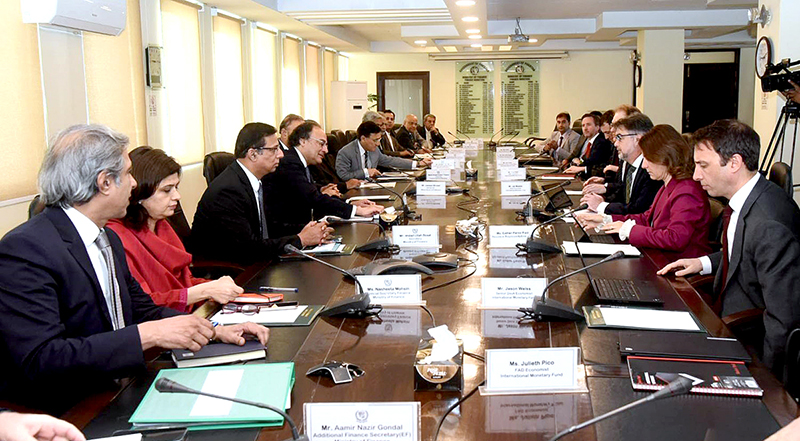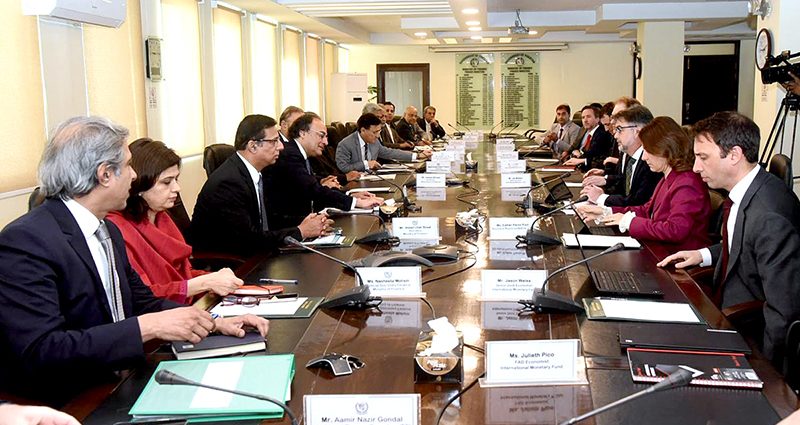
IMF mission in Pakistan to conduct the second review of the Stand by ArrangementMission calls on Federal Minister of Finance Muhammad Aurangzeb
The finance minister thanked the IMF for their continued support & hopes for productive meetings during the second review
ISLAMABAD ( Web News )
An IMF mission called on Federal Minister of Finance and Revenue, Muhammad Aurangzeb in the Ministry of Finance on Thursday.
The IMF mission is in Pakistan to conduct the second review of the Stand by Arrangement (SBA). Federal Minister of Finance and Revenue, Muhammad Aurangzeb welcomed the mission and expressed the government’s commitment to working with IMF on the reform agenda for economic growth and stability of Pakistan. IMF mission head Nathan Porter, congratulated the Federal Minister of Finance and Revenue, Muhammad Aurangzeb on his appointment. Discussions were held on the overall macroeconomic indicators, the government’s efforts on fiscal consolidation, structural reforms, energy sector viability, and SOE governance.
Federal Minister of Finance and Revenue, thanked IMF for their continued support and hoped for productive meetings during the second review.
An International Monetary Fund delegation began a review of Pakistan’s current loan program Thursday as the cash-strapped country looks for additional funding to tackle its economic challenges.
The four-day review will decide whether to release the final payment under a $3 billion IMF bailout package, which Islamabad secured last year to avert a sovereign debt default.
An official Pakistani statement issued after the opening session said that Finance Minister Muhammad Aurangzeb and Nathan Porter, the IMF mission chief in Pakistan, led their respective teams at the meeting.
Aurangzeb was quoted as expressing his government’s commitment to work with the IMF “on the reform agenda for economic growth and stability” in Pakistan.
The statement said without elaborating, “Discussions were held on the overall macro-economic indicators, government’s efforts on fiscal consolidation, structural reforms, energy sector viability, and SOE (state-owned enterprise) governance.”
Pakistan has already received about $1.9 billion from the IMF under the 9-month stand-by arrangement (SBA), which will expire in April.
Prime Minister Shehbaz Sharif’s newly elected coalition government said ahead of the talks that Islamabad was on track to receive the last SBA installment of about $1.1 billion.
Pakistan’s Finance Ministry reported Wednesday that it “has met all structural benchmarks, qualitative performance criteria, and indicative targets for successfully completing the IMF review.”
The ministry added that the appraisal was expected to produce a “staff-level agreement,” and the remaining payment would be disbursed after the IMF executive board approved it.
A spokesperson for the Washington-headquartered global lender said in the run-up to Thursday’s talks that the focus of its mission would be on completing Pakistan’s “current SBA-supported program, which ends in April 2024.”
Aurangzeb told reporters earlier this week that his government would use the opportunity during the review meetings to make a case for “a longer and larger” loan program under the IMF’s Extended Fund Facility, or EFF. However, he did not state the size of the additional funding required by his country.
The EFF provides financial assistance to countries facing serious medium-term balance of payments problems because of structural weaknesses that require time to address.
Aurangzeb said that his government “would be very keen” to start discussions on the EFF with the IMF. The minister added that he would be traveling to Washington next month for further discussions on the subject at the IMF and World Bank’s spring meetings.
Pakistan held national elections last month, returning Sharif to power for a second time amid widespread allegations of voter fraud and military interference. Analysts said that the controversy-marred election outcome had dampened hopes for much-needed political stability to address economic challenges facing the nuclear-armed South Asian nation.
Despite securing more than 20 IMF loan programs, a lack of critical reforms dwindling foreign exchange reserves, a balance of payment crisis, rising inflation, record local currency depreciation, and persistent political turmoil over the past several years continue to cripple Pakistan’s debt-ridden economy.

